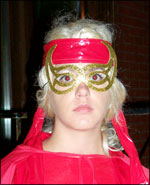From Philip Larkin’s “Aubade”
From Philip Larkin’s “Aubade“:
I work all day, and get half drunk at night.
Waking at four to soundless dark, I stare.
In time the curtain edges will grow light.
Till then I see what’s really always there:
Unresting death, a whole day nearer now,
Making all thought impossible but how
And where and when I shall myself die.
Arid interrogation: yet the dread
Of dying, and being dead,
Flashes afresh to hold and horrify.The mind blanks at the glare. Not in remorse
– The good not used, the love not given, time
Torn off unused – nor wretchedly because
An only life can take so long to climb
Clear of its wrong beginnings, and may never:
But at the total emptiness forever,
The sure extinction that we travel to
And shall be lost in always. Not to be here,
Not to be anywhere,
And soon; nothing more terrible, nothing more true.This is a special way of being afraid
No trick dispels. Religion used to try,
That vast moth-eaten musical brocade
Created to pretend we never die,
And specious stuff that says no rational being
Can fear a thing it cannot feel, not seeing
that this is what we fear – no sight, no sound,
No touch or taste or smell, nothing to think with,
Nothing to love or link with,
The anaesthetic from which none come round.And so it stays just on the edge of vision,
A small unfocused blur, a standing chill
That slows each impulse down to indecision
Most things may never happen: this one will,
And realisation of it rages out
In furnace fear when we are caught without
People or drink. Courage is no good:
It means not scaring others. Being brave
Lets no-one off the grave.
Death is no different whined at than withstood.
From Philip Larkin’s “Aubade” Read More »
 For the past seven years Terrifica has been patrolling New York’s party and bar scene, looking out for women who have had a little too much to drink and are in danger of being taken advantage of by men. She says she has saved several women from both themselves and predators who would prey upon their weaknesses — both from alcohol and a misguided notion that they have to go out drinking to find a companion.
For the past seven years Terrifica has been patrolling New York’s party and bar scene, looking out for women who have had a little too much to drink and are in danger of being taken advantage of by men. She says she has saved several women from both themselves and predators who would prey upon their weaknesses — both from alcohol and a misguided notion that they have to go out drinking to find a companion.